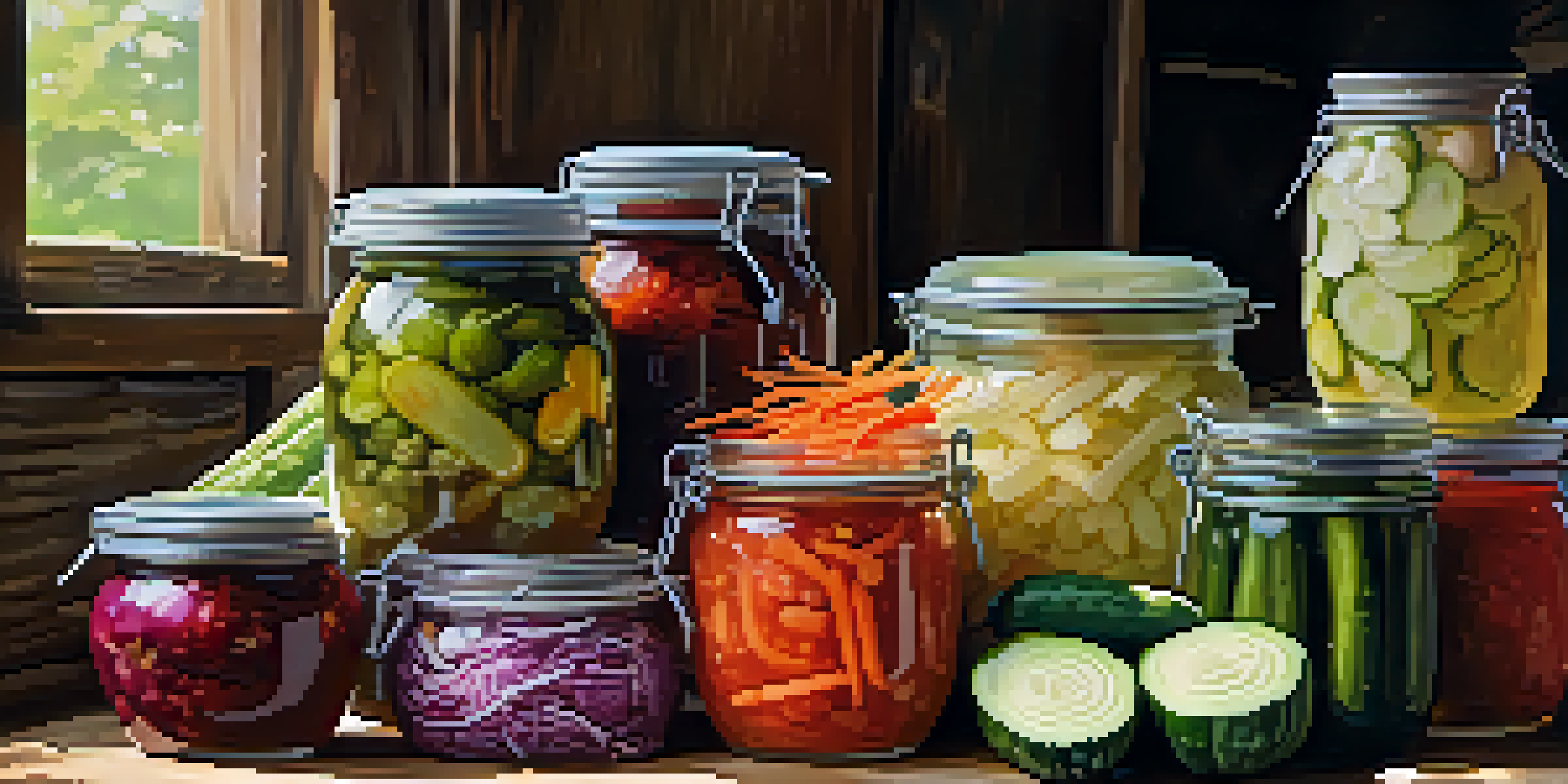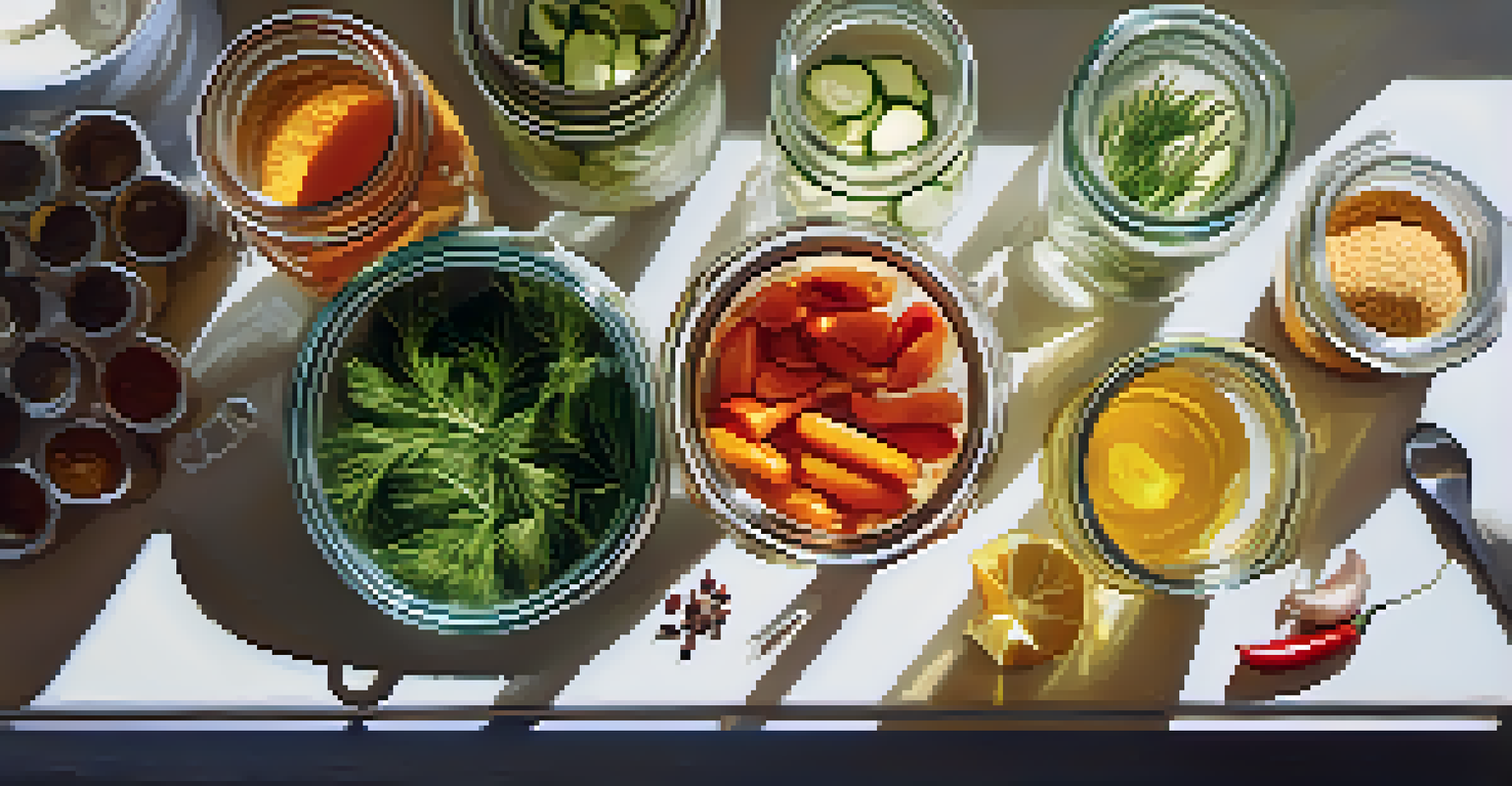The Art of Fermentation: A Traditional Practice Worth Saving

Understanding Fermentation: A Brief Overview
Fermentation is a natural process that transforms food through the action of microorganisms, such as bacteria and yeast. It’s not just a method of preservation; it enriches flavors and enhances nutritional benefits. Think of it as nature's way of turning simple ingredients into something extraordinary, like how grape juice becomes wine.
Fermentation is the ultimate form of food preservation—the way to ensure that food remains edible and nutritious long after harvest.
This age-old technique has been practiced for thousands of years across various cultures. From kimchi in Korea to sauerkraut in Germany, each culture has developed its unique fermentation methods. These traditional practices not only serve culinary purposes but also foster community and connection.
In today's fast-paced world, the art of fermentation is often overlooked. However, a resurgence of interest in homemade foods and natural processes is bringing this practice back into the spotlight, making it a worthy tradition to revive and celebrate.
The Health Benefits of Fermented Foods
Fermented foods are packed with probiotics, which are beneficial bacteria that support gut health. This is particularly important as our digestive system plays a crucial role in overall well-being. Consuming foods like yogurt or kefir can help maintain a healthy balance of gut flora, leading to improved digestion and immunity.

In addition to probiotics, fermentation can enhance the bioavailability of nutrients, making them easier for our bodies to absorb. For example, fermented soy products, like tempeh, provide higher levels of protein and vitamins than their unfermented counterparts. It's like giving your meal a nutritional upgrade.
Health Benefits of Fermented Foods
Fermented foods are rich in probiotics, enhancing gut health and nutrient absorption while potentially benefiting mental well-being.
Moreover, some studies suggest that fermented foods may have positive effects on mental health, potentially reducing symptoms of anxiety and depression. Eating these foods can be a delicious way to take care of both your body and mind, creating a holistic approach to wellness.
Common Fermented Foods and Their Uses
You might be surprised by the variety of fermented foods that exist worldwide. From tangy pickles and rich miso to bubbly kombucha, each offers unique flavors and health benefits. Incorporating these foods into your diet can be as simple as adding a dollop of sauerkraut to your sandwich or sipping on a refreshing glass of kombucha.
The act of fermentation can be seen as a celebration of food and culture, a way to connect with our ancestors and our communities.
Fermented foods can also serve as versatile ingredients in cooking. For instance, using yogurt as a marinade can tenderize meat while adding flavor. Similarly, miso can be used in dressings and soups, imparting a deep umami taste that elevates any dish.
With such a wide range of options, there’s no shortage of ways to explore fermentation in your kitchen. Experimenting with different fermented foods can add excitement to your meals and inspire creativity in your culinary adventures.
Getting Started with Home Fermentation
If you're interested in trying fermentation at home, starting with something simple can be a great way to dip your toes in. Pickling vegetables, for example, requires minimal ingredients and equipment. All you need are fresh veggies, water, salt, and a jar—it's that easy!
As you gain confidence, you can explore more complex projects like making your own yogurt or crafting a batch of sourdough bread. There are plenty of resources available, including books and online tutorials, to guide you through each step. Remember, fermentation is as much about experimentation as it is about precision.
Cultural Significance of Fermentation
Fermentation reflects cultural heritage and community, with each traditional food telling a unique story about the people and practices behind it.
One of the best parts about fermenting at home is the opportunity to personalize your creations. You can adjust flavors by adding different spices or herbs, making each batch uniquely yours. Plus, there's something incredibly rewarding about enjoying food that you've made from scratch.
The Role of Fermentation in Food Preservation
Historically, fermentation was a vital method for preserving food before the advent of refrigeration. This method not only extends the shelf life of perishable items but also enhances their flavor profile. For example, fermenting cabbage into sauerkraut allows it to be stored for months while developing a delicious tangy taste.
Today, with modern technology, we often overlook traditional preservation methods. However, incorporating fermentation into our food storage practices can reduce waste and encourage sustainable living. Think of it as a way to honor our ancestors while also being environmentally conscious.
By embracing fermentation as a preservation technique, we can also reconnect with the food we consume. It invites us to appreciate the process, the ingredients, and ultimately, the flavors that nature provides. This mindfulness can lead to a more fulfilling and sustainable approach to eating.
Cultural Significance of Fermentation Worldwide
Fermentation is not just a culinary technique; it carries deep cultural significance in many societies. From the spicy fermented fish sauces in Southeast Asia to the traditional Indian fermented lentil dish called dosa, each food tells a story about the people and traditions behind it. These foods often symbolize community, heritage, and shared experiences.
Participating in fermentation can also foster a sense of belonging. Whether you're attending a local fermentation workshop or sharing homemade kimchi with friends, it creates opportunities for connection. These communal experiences can strengthen bonds and create lasting memories.
Future Trends in Fermentation
The future of fermentation is bright, with increasing interest in plant-based products and a resurgence of home fermentation practices.
As we continue to explore global cuisines, it's essential to respect and celebrate the cultural roots of fermentation. By understanding the stories behind these foods, we enrich our own culinary journey and honor the diversity of practices that have shaped our eating habits.
The Future of Fermentation: Trends and Innovations
The future of fermentation looks promising, with a growing interest in plant-based and alternative fermented products. Innovations like fermented nut cheeses and plant-based probiotics are emerging, offering exciting options for those with dietary restrictions. This evolution reflects a broader trend toward healthier eating and sustainable food practices.
Additionally, the rise of home cooking during recent years has reignited interest in traditional fermentation techniques. People are turning to their kitchens to explore hands-on food crafting, creating a stronger connection between what they eat and how it’s made. It’s a movement that encourages mindfulness in our dietary choices.

As we look ahead, fermentation will continue to play a vital role in our food systems. By combining traditional methods with modern innovations, we can create a more sustainable and diverse food landscape that honors the past while embracing the future.